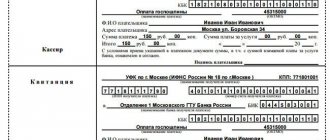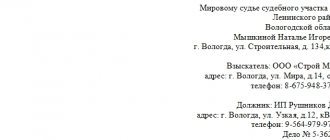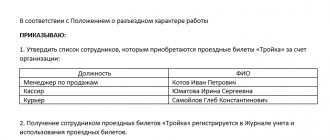If the participants in the trial do not agree with the decision, they have the right to file an appeal with a request for its review. The document must be filed with the higher court before the previous decision enters into force. When filing an appeal, the state fee must be paid by the applicant in the amount prescribed by law.
The state fee for the appeal is paid before the start of legal proceedings. Payers are citizens and legal entities. The exception is for entities included in the category of beneficiaries: they may be exempt from state duty or given a deferment. Before filing a complaint and paying the fee, the applicant must clarify where exactly he needs to take the receipt for the transfer of funds, which court of appeal he belongs to.
A payment document confirming payment is attached to the submitted complaint. The court may revise the payment procedure based on the results of the consideration of the case. The consequences may be as follows
- the court satisfies the plaintiff’s demands and obliges the defendant to compensate for the state duty expenses incurred by him;
- the court does not satisfy the filed claim, the applicant is not compensated for the money he paid;
- the court partially satisfies the requirements, while all costs of state duty are distributed between the parties.
Calculation features, example
A state fee must be paid for filing a complaint with the arbitration court of appeal. Moreover, its size may be different. So, the state duty is equal to:
- In case of filing a complaint against the decision of the first court (or in cassation against a court order) - 50% of the amount of state fees charged for filing non-property claims (Part 12, Clause 1, Article 333.21 of the Tax Code of the Russian Federation, Clause 34 33 of the Resolution of the Plenum of the Supreme Arbitration Court of Russia No. 46 of July 11, 2014).
- When filing a supervisory complaint with the RF Armed Forces - 100% of the amount of the fee paid in case of filing non-property claims.
For comparison: The state fee for an appeal in civil cases, that is, cases within the jurisdiction of courts of general jurisdiction, is equal to 50% of the amount of the fee for accepting a non-property claim by the court (Part 3, Clause 9, Clause 1, Article 333.19 of the Tax Code of the Russian Federation). To make it more clear, the table below shows all the amounts of the state duty and the grounds for its collection.
| № | Appeal against the decision of the first arbitration court on | State duty amount | |
| For individuals | For legal entities | ||
| 1 | Corporate disputes | 3,000 rub. | 3,000 rub. |
| 2 | Failure to fulfill contractual obligations | 3,000 rub. | 3,000 rub. |
| 3 | Cancellation of an arbitration court decision due to violations committed in the arbitration process | 3,000 rub. | 3,000 rub. |
| 4 | Claim for enforcement of a court decision located outside the Russian Federation (arbitration award) | 3,000 rub. | 3,000 rub. |
| 5 | Non-property claims (for example, for recognition of rights) | 3,000 rub. | 3,000 rub. |
| 6 | Actions, non-normative decisions or legal acts of government. authorities, regional and city authorities | 150 rub. | 1,500 rub. |
| 7 | Securing a claim | 0 rub. | 0 rub. |
| 8 | Establishment of significant circumstances (facts) in the case | 1500 RUR | 1500 RUR |
| 9 | Registration of writ of execution(s) | 1,500 rub. | 1,500 rub. |
| 10 | Debtor's claim for bankruptcy | 150 rub. | 3,000 rub. |
| 11 | The plaintiff’s application to appeal the regulations, which provide clarifications of the legislation of the Russian Federation | 150 rub. | RUR 2,250 |
| 12 | Statement of claim to appeal decisions (acts) of Rospatent (FAS, Ministry of Agriculture) in the field of protection of exclusive rights to a patent, containing detailed explanations of the legislation of the Russian Federation on this issue | 150 rub. | 1,000 rub. |
A calculator for calculating the state duty on an appeal can be used here .
Do I need to pay a state fee for an appeal?
State duty is one of the types of government fees that is collected when citizens apply to various authorities with a request to perform certain legally significant actions in relation to them. This is the only payment made to the state for the provision of services. Demanding other payments is unacceptable (the only exception is services provided by consular posts).
The first group of subjects includes:
- plaintiffs in cases in the field of illegal administrative decisions regarding them; in the field of wages and benefits; about alimony; on the protection of the rights of persons with disabilities; about forced hospitalization in an institution providing psychiatric care; for compensation for damage from injury, death of the breadwinner or from a criminal assault;
- parties to divorce;
- prosecutors;
- subjects who have suffered from repression, displaced persons and refugees on administrative issues related to their status;
- Rospotrebnadzor, as well as other authorities in consumer protection cases;
- persons applying for children's rights, as well as for adoption;
- Commissioner for Human Rights, state authorities and local self-government;
- authors of the fruits of intellectual activity in certain categories of cases in the field of intellectual property.
The second group of people includes:
- disabled people of group 1 or 2 filing individual appeals and complaints on behalf of associations;
- veterans of military and combat operations;
- plaintiffs about violation of their rights as consumers;
- pensioners when filing an appeal about the payment of a pension.
Procedure and terms of payment by an individual, where to get details
The state duty can be paid only before sending the appeal to the court (Article 333.18 of the Tax Code of the Russian Federation). In this case, the tax fee is paid to the address where the AAS is located. You can pay it:
- cash (banknotes);
- in non-cash form (by card, via the Internet).
State duty is paid (optional):
- In the bank.
- Through online banking (on the bank's website).
- At the Russian Post Office.
- In your personal account on the State Services website.
The fact of payment of the state duty by bank transfer (by card, via the Internet) is confirmed by a notification with a stamp from a local bank or a division of the Federal Treasury about its execution.
Evidence of payment of the state duty by bank transfer is considered to be a receipt, which, in accordance with clause 3.8 of Part 1 of the Regulations of the Central Bank of the Russian Federation No. 2-P of October 3, 2002 on settlements by bank transfer in the Russian Federation, indicates:
- in the field “Writing off from the payer’s account” - the date of writing off the money from the taxpayer’s current account (if paying the state duty in installments - the day of the last payment);
- in the item “Bank Mark” - the stamp of the bank (Federal Treasury body) and the personal signature of the responsible official.
The fact of paying the tax fee in cash is certified (optional):
- notification from the bank about payment of the fee;
- a receipt from the cashier or from an employee of the government agency (institution) where the payment was made.
The fact of payment of the state duty is also confirmed using the information provided in the payer’s personal account on the State Services website. Moreover, when paying such a fee in the personal account on the State Services portal, documentary evidence of such actions is not required.
The state fee must be paid before filing an appeal with the court (Article 333.18 of the Tax Code of the Russian Federation). It happens that the plaintiff does not want to voluntarily pay such a tax fee. Then, after the final court verdict on the complaint is made and such a decision comes into force, the judge issues a writ of execution to collect the fee.
The state duty is credited to the Federal Tax Service at the address of the court of appeal in arbitration. Details for paying such a fee are posted on the AAS website. Thus, when sending a complaint to the Ninth Arbitration Court of Appeal, payment details for the state duty are taken from Letter of the Federal Tax Service of Russia No. 13 for Moscow No. 20-21/01560 dated January 25, 2021.
In the event of early closure of the appeal proceedings, the state fee paid when filing it is returned (clause 11 of the Resolution of the Supreme Arbitration Court of the Russian Federation No. 46). Foreign companies (firms), foreigners and stateless persons pay it in the manner and amounts that are introduced for enterprises (companies, firms) and individuals (clause 4 of article 333.18 of the Tax Code of the Russian Federation).
State fee for filing an appeal in a civil case
Whatever option the payer chooses, the main and mandatory rule is to correctly enter the details for making the payment. If you make a mistake, the money to pay the state fee may go in the wrong place, or it may get stuck in the system, and it may be difficult to get it back. In this case, you will have to write a statement to the bank about incorrectly providing payment details and wait for a refund.
Note! In the case of an existing deferment in payment of the state fee or installment plan (payment of the fee in installments over a period of time), you should be guided by the provisions of Art. 90 Code of Civil Procedure of the Russian Federation, Art. 333.20 and Art. 333.41 of the Russian Federation. In Art. 333.40 of the Tax Code of the Russian Federation stipulates the procedure for the return of state duty and its offset.
How to submit a payment order for state duty to the arbitration court
The procedure and deadline for paying state duty are regulated by the legislation of the Russian Federation. Despite this, many participants in the arbitration process, when paying the fee, make the most common mistakes related to the timing and procedure for paying the state fee.
As a result, the appeal remains without consideration. To avoid this, keep in mind that:
- Individuals pay a notice to pay the state duty, and legal entities pay a payment order.
- The receipt must contain a note from a credit institution, bank or regional branch of the Treasury of the Russian Federation about the write-off of money to pay the state duty.
- The notice (payment order) is presented to the court only in the original. Submission of a photocopy of the payment document is permitted only when filing a complaint through the AAS website or in the My Arbitr system (my.arbitr.ru). However, you will still need to submit the original receipt to the court later (at the request of the judge).
- The payer of the state duty must be the plaintiff. If the payer of the fee is another person, he must document that he has the authority to pay the tax fee on behalf and at the expense of the plaintiff. In this case, in the section of the notice “Purpose of payment”, information about for whom the tax payment was made must be indicated.
If the plaintiff submits an application for an installment plan (deferment) of payment of the state duty, the following must be attached to it:
- a list of payer accounts confirmed by the local Federal Tax Service and the addresses and names of banks and other similar credit institutions where such accounts were opened (including their branches);
- information certified by the bank(s) about the absence of money in the plaintiff’s current account in an amount sufficient to pay the state duty, as well as about the amount of debt on unpaid receipts and writs of execution (sheets).
As a sample, the details of the arbitration court for payment of state fees by legal entities can be found here. A sample of filling out a Notice for the payment of such a fee by individuals through branches of Sberbank of Russia can be found here.
Articles:
Receipt and details for paying the state fee for individual entrepreneur registration
Cancellation of a writ of execution and termination of enforcement proceedings
Distribution of payment between participants in the process
Payment of state duty is carried out in accordance with the following rules:
- When filing a collective appeal, the state fee is paid by the plaintiffs in equal parts.
- If one of the applicants has benefits, their share is not paid by the others. Thus, the amount of the fee is reduced by the share of the person having the benefit.
- If the appeal is granted, the obligation to pay the fee falls on the losing party.
- The court's act usually imposes an obligation on the defendant to reimburse the amount of the fee within ten days from the date of the decision.
- If the claims of the complaint are partially satisfied, the amount of the state duty is divided proportionally between the parties. Let’s say that if half of the demands are satisfied, the state duty is divided in equal parts between the plaintiff and the defendant. If the fourth part of the claim is satisfied, the defendant pays ¼ of the fee.
If the applicant is confident that the decision of the court of first instance is illegal, then he can count on the defendant to return the amount of the paid state fee when revising the decision in his favor.
Application deadlines
6 months is the time period provided by law for appealing an appeal decision. A valid reason for the loss of time will allow the period for a possible review of the verdict to be restored. Grounds for renewal of the period:
- the applicant's documented illness;
- business trip for a long time;
- other reasons indicating the inability to use the 6-month time period.
Circumstances that occurred within 12 months after the contested decision became valid may affect the renewal of this right.
Exceptions to the duty payment rule
There is a fairly large list of those who can take advantage of the preferential right to non-payment of state duty. It is constantly reviewed and updated. Today, there are a number of applicants who do not need to pay a fee when filing an appeal.
These include:
- government bodies in procedures to defend their interests;
- child protection petitioners;
- copyright applicants;
- persons with disabilities of groups I and II;
- consumers seeking protection under the PPA.
There is also the right to deferment and installment plan. In this case, it is necessary to submit a petition citing a difficult material and financial situation, as a consequence of the inability to collect the required amount.
Moreover, this state of affairs can be argued by the fact that the consideration in the previous instance required large expenses.
Example: Natalya Yurtseva, Samara. Filing a claim against a credit institution for illegally opening a loan for a dummy, she demanded compensation for the loan in the amount of 75 thousand and moral damages in the amount of 70 thousand rubles.
Not understanding how much to pay as state duty, I turned to specialists. As a result, it turned out that she did not need to pay the fee, since her appeal was within the framework of consumer protection under the PPA.






